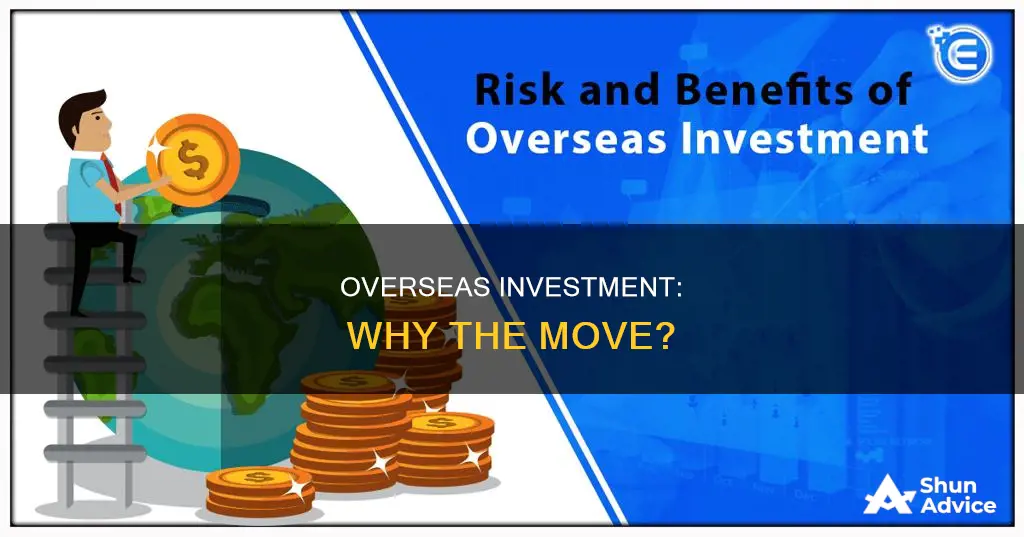
Investing overseas is an increasingly popular strategy for companies and individuals alike. One of the main benefits is international diversification, which can reduce the volatility of investments by spreading risk across multiple markets. For example, if one economy is in a recession, a company with operations in another, booming economy will be less affected overall. This strategy also helps companies access new customers in foreign markets, creating foreign affiliates and becoming multinationals in the process.
Another advantage of investing overseas is the potential for lower costs of production in developing economies, thanks to the availability of cheap labour. Companies with labour-intensive production processes, in particular, have an incentive to invest overseas and benefit from these cost efficiencies.
Overseas investment can also help companies avoid import restrictions and tariffs in certain countries. By building production units within the country, they can sidestep import quotas and high tariff rates.
However, investing overseas also carries risks. Differences in regulations and taxes between countries can lead to longer delays in buying and selling assets. There may also be additional costs, from currency conversions to foreign levies and transaction fees. Political and economic changes in a foreign country can also negatively impact investments.
| Characteristics | Values |
|---|---|
| Decrease exposure to one market | International diversification |
| Gain exposure to markets with different economic forces | Sectors that are under-represented in the home country |
| Avoid saturation in developed markets | Expand into other markets that are not yet saturated |
| Avoid import restrictions | Build production units inside the country |
| Avoid tariffs | Invest directly in the country |
| Access to cheaper labour | Lower costs of production |
| Avoid high transportation costs | Produce in the countries where the products are sold |
| Access to new customers in foreign markets | Create foreign affiliates |
| Create more jobs in the home country | Higher wages |
| More stable as employers | |
| Less likely to go bankrupt | |
| Access to higher structural growth opportunities | |
| Reduce the risk of being exposed to a single currency, economy or political framework |
What You'll Learn

To reduce the risk of exposure to one market
Investing overseas is a strategy that can help investors reduce the risk of exposure to one market. Diversification is a popular technique that results in international diversification and entails benefits for companies and investors. For instance, if one economy is in a recession while another economy in a different region is experiencing a boom, a company or investor with a presence in both countries will be less affected by the recession and will be less prone to business cycles.
International diversification can also help investors access new customers in foreign markets and create foreign affiliates, becoming multinational in the process. This can lead to increased sales and revenue, as seen with U.S. companies that invest abroad, which tend to create more jobs in the United States and pay higher wages than companies focused solely on the domestic market.
Additionally, investing in foreign markets can provide access to lower costs of production in certain economies, such as those with cheap labour. Companies with labour-intensive production processes have a larger incentive to invest overseas to benefit from these cost efficiencies.
However, investing overseas also comes with risks. International investors may face higher transaction costs, currency volatility, and liquidity issues. It is important for investors to carefully analyse the economic, political, and business risks of a country before investing, as these factors can impact the potential returns and losses of their investments.
Young Investors: Why the Apathy?
You may want to see also

To access new customers in foreign markets
Investing overseas allows companies to access new customers in foreign markets, which can be crucial for expanding commercial activities, diversifying revenue sources, and stimulating economic growth. This is especially true when domestic markets are saturated or limited in scope. By venturing into new markets, businesses can tap into a larger customer base, increasing their sales and revenue streams.
When companies invest in foreign markets, they can also benefit from diversifying their sources of income. Relying solely on domestic markets can make a business vulnerable to economic downturns or shifts in consumer preferences. By expanding internationally, companies can reduce their exposure to a single market and mitigate the impact of economic fluctuations in any one region.
Additionally, investing overseas provides opportunities for businesses to adapt their products and services to meet the needs and preferences of international customers. Companies that successfully navigate the complexities of international business, including legal and regulatory requirements, cultural differences, and local competition, can gain a competitive advantage and strengthen their brand recognition in new markets.
Furthermore, investing in foreign markets can be a strategic move to reduce transportation costs, especially for products that are challenging to ship or have high transportation costs. By establishing production units in the countries where they sell their products, companies can streamline their supply chain and improve operational efficiency.
Overall, by accessing new customers in foreign markets, companies can drive growth, mitigate risks, and enhance their global presence.
FI Seekers: Investment Strategies
You may want to see also

To take advantage of lower costs of production
Investing overseas allows companies to take advantage of lower costs of production, particularly reduced labour costs. For instance, US companies that have opened assembly plants in other countries have benefited from lower wages compared to US employees in the manufacturing sector. According to a 2013 report, the average hourly wage for a Chinese manufacturing worker between 2002 and 2009 was less than 10% of the average hourly wage of a US manufacturing worker. This partly explains why US investment in the manufacturing sector in China grew from $12 billion in 2002 to $54 billion in 2009.
Similarly, many organisations have invested large sums overseas in markets such as China, India, Tanzania and Brazil to benefit from lower costs of production. These cost efficiencies are a result of the availability of cheap labour in the developing world. Companies with labour-intensive production processes have a larger incentive to invest overseas and take advantage of these cost efficiencies.
In addition to labour costs, transportation costs are also reduced when companies invest overseas. Many global organisations sell a large portion of their products to the developing world, and it is more efficient for these companies to produce goods in the countries where they sell them, especially if the products are difficult to ship or have high transportation costs.
Moreover, companies that invest overseas can benefit from tax breaks and lower tax rates in certain countries. For example, historically, countries such as Ireland have had corporate tax rates lower than those in the US. By moving profits into foreign subsidiaries located in other countries, companies can reduce their tax obligations.
By taking advantage of lower costs of production overseas, companies can improve their bottom line and remain competitive in a global market.
Markets: The Freeze
You may want to see also

To avoid import restrictions
Import restrictions are often imposed by governments to protect national interests and security. These restrictions can include import quotas, which limit the amount of a product that can enter a market, and high tariff rates, which are taxes imposed on imports.
To avoid these restrictions, companies may choose to invest directly in the countries imposing them by building production units within their borders. This strategy allows companies to maintain their business operations and avoid the negative consequences of import restrictions, such as reduced supply and increased costs.
For example, transportation costs can be a significant factor in a company's decision to invest overseas. By producing goods in the countries where they are sold, companies can reduce transportation costs and improve efficiency.
Additionally, companies can benefit from investing in countries with lower production costs due to the availability of cheap labour. This is particularly advantageous for companies with labour-intensive production processes.
By investing overseas, companies can also gain access to new customers and markets, creating more jobs and higher wages. It allows them to expand their operations and maintain growth, even in saturated markets.
However, investing overseas also comes with challenges and risks. National security concerns, labour laws, and complex foreign investment regulations can impact a company's ability to invest in other countries. It is important for companies to carefully navigate and comply with the laws and regulations of both their home country and the host country to ensure a successful international investment strategy.
Rich People: The Only Investors?
You may want to see also

To diversify portfolios
Investing overseas is a great way to diversify portfolios. Diversification is a common strategy used by financial planners, fund managers, and individual investors. The central idea is to never put all your eggs in one basket. By investing in foreign markets, investors can reduce their exposure to a single market and gain access to emerging and developed markets. This strategy can also help neutralise currency fluctuations.
An international portfolio can be an excellent way to achieve diversification. It allows investors to access stocks in economies that may be growing faster than their domestic market, such as China and India. These markets can provide higher returns and lower correlations, reducing the overall risk of the portfolio. Additionally, investing in commodities-based emerging markets, such as Brazil and Russia, can lower the correlation with the US market, as argued by Gerald R. Jensen, a professor at Creighton University's Heider College of Business.
However, investing in foreign markets does come with risks. One significant risk is currency exchange rates. If the US dollar falls, an investor's international portfolio may be negatively impacted. Another risk is political and economic instability in emerging markets, which can be difficult to predict and tolerate for many investors. Furthermore, investing in international stocks often comes with increased transaction costs, including commissions, brokerage charges, taxes, and stamp duties, which can reduce overall returns.
To mitigate these risks, investors can consider investing in exchange-traded funds (ETFs) or mutual funds that focus on foreign equities. These funds provide exposure to a diverse range of foreign markets while helping to reduce the impact of risks associated with international investing. Additionally, investors should aim for a manageable number of investments, typically around 20 to 30, to effectively monitor and manage their portfolio.
Dollar General: A Smart Investment Move?
You may want to see also
Frequently asked questions
Investing overseas helps people diversify their portfolios and reduce the risk of being exposed to a single market, currency, economy, or political framework.
Investing overseas can help people access markets with different economic forces. This means that when some regions are experiencing a downturn, others may be seeing growth, thus potentially smoothing returns.
Investing overseas carries additional risks, such as differences in regulations and taxes, currency fluctuations, and economic and political threats.







